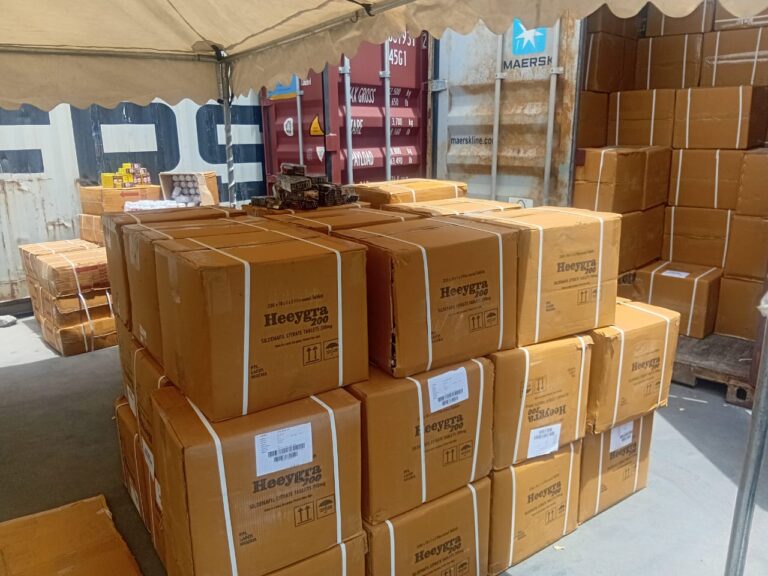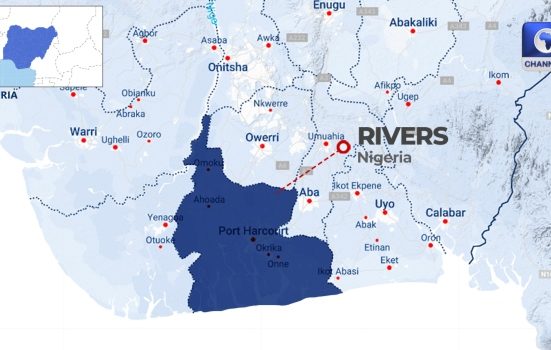The Nigeria Customs Service (NCS) has intercepted 11 containers loaded with unregistered pharmaceutical products, expired consumables, and security-sensitive equipment valued at N921 million at the Apapa Port, Lagos, in what authorities have described as a disturbing indication of evolving smuggling tactics and threats to national security.
Addressing journalists on Wednesday during a press briefing at the Apapa Command, the Comptroller-General of Customs, Bashir Adewale Adeniyi, stated that the seizures were made between January 2025 and the present day. The intercepted goods, he noted, include unapproved sex enhancement drugs, expired margarine, and various high-risk equipment such as drones and communication gadgets, all illegally imported into the country without required certifications.
Adeniyi disclosed that the 11 containers comprised five 40-foot containers, two 20-foot containers, and four additional containers bearing loosely packed contraband. Among the most alarming discoveries were five containers stuffed with various forms of unregistered sexual performance enhancement drugs. These include 1,001 cartons of hydra-sildenafil citrate tablets and 1,400 packages of “chest and lungs beta plus big booty tablets” — all lacking the mandatory registration and certification from the National Agency for Food and Drug Administration and Control (NAFDAC).
He explained that one of the 40-foot containers was falsely declared as containing cosmetic powder, a tactic used to disguise the true nature of the items. Two 20-foot containers were found to be carrying expired margarine products, posing a direct threat to consumer health. In addition, security-related items were seized, including 60 units of “warrior drones” with a duty-paid value of N15.9 billion, intercepted due to the absence of an End User Certificate from the Office of the National Security Adviser. Another shipment of 53 helicopter drones and 10 pieces of professional FM transceiver walkie-talkies were also confiscated for similar reasons.
Adeniyi warned that the rising trend in the illegal importation of unregulated sexual enhancement drugs presents serious health dangers, including cardiovascular complications and harmful drug interactions, particularly when used without medical supervision. He categorised the seized items into three groups. The first, making up 63.7 per cent of the total, consists of unregistered pharmaceutical products. These violate Section 28 of the NAFDAC Act, Cap N-1, Laws of the Federation, and include several products bearing fake or manipulated registration numbers.
The second category, according to Adeniyi, includes expired food items with compromised safety standards that could endanger public health if introduced into the Nigerian market. He explained that some of the margarine products intercepted had exceeded their shelf life and were deliberately concealed among unrelated goods to evade scrutiny.
The third category includes restricted technology, notably drones and telecommunication equipment, imported without necessary End User Certificates, thereby breaching Nigeria’s national security protocols. Adeniyi raised concerns over a sophisticated and coordinated pattern of false declarations and concealment, pointing to a shift from isolated smuggling to more complex, organized syndicates using deceptive documentation to push contraband across borders.
He said, “Two of the containers had pharmaceutical products deliberately concealed under layers of skincare creams and lotions to mislead customs officials and bypass regulatory inspection. These seizures point to an alarming diversification of contraband strategies, where smugglers now combine pharmaceuticals, expired food, and sensitive security equipment in single shipments.”
The Comptroller-General further explained that the Customs Service, in its enforcement role, has continued to strengthen collaboration with other key regulatory agencies such as NAFDAC, the National Drug Law Enforcement Agency (NDLEA), and the Office of the National Security Adviser. He added that these agencies operate under formal Memoranda of Understanding and joint operational frameworks, significantly enhancing inter-agency intelligence and surveillance operations.
“In our joint operations report for January 2025, we highlighted the growing intersection between counterfeit pharmaceuticals, unauthorised equipment imports, and national security risks. This multifaceted threat demands a sustained, collaborative response to safeguard both public health and national sovereignty,” Adeniyi stated.
Also speaking at the press briefing, the Director of Ports Inspection for NAFDAC, Dr. Olakunle Olaniran, confirmed that many of the intercepted drugs carried fake or misleading NAFDAC numbers. One such product, originally intended for industrial coal treatment, was repackaged and presented with the registration number of a well-known pain relief drug, tramadol. He also disclosed that another falsely labelled item was promoted as a mental health medication but lacked any formal pharmaceutical classification or regulatory approval.
Olaniran warned that such practices pose grave risks to unsuspecting Nigerians, especially when dangerous substances are disguised as approved therapeutic products. He affirmed NAFDAC’s continued commitment to working with Customs and other agencies to identify and remove these illicit goods from circulation.
The Customs Service reiterated its resolve to intensify surveillance and enforcement across Nigeria’s borders and seaports to dismantle smuggling networks and ensure that only certified goods reach Nigerian markets.







